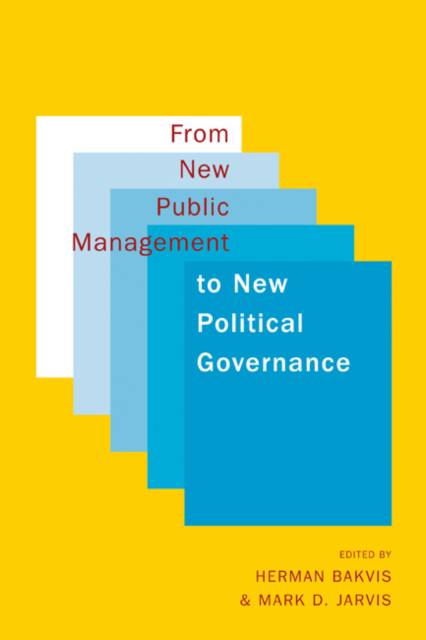
- Afhalen na 1 uur in een winkel met voorraad
- Gratis thuislevering in België vanaf € 30
- Ruim aanbod met 7 miljoen producten
- Afhalen na 1 uur in een winkel met voorraad
- Gratis thuislevering in België vanaf € 30
- Ruim aanbod met 7 miljoen producten
Zoeken
From New Public Management to New Political Governance
Essays in Honour of Peter C. Aucoin
Herman Bakvis, Mark D Jarvis
Paperback | Engels
€ 55,45
+ 110 punten
Uitvoering
Omschrijving
With the direct participation of partisan political staff in governance, the onset of permanent election campaigns heavily dependent on negative advertising, and the expectation that the public service will not only merely implement but enthusiastically support the agenda of the elected government, we are experiencing a new form of political governance. The late Peter Aucoin (1943-2011) has argued that traditional norms of impartial loyalty have been displaced by partisanship on the part of civil servants and that the political executive is keen on directly controlling all aspects of communication and interaction between government and citizens. The arrival of New Political Governance has a direct bearing on the long-standing tension between the need of ensuring democratic control over bureaucracy, while also allowing the public service sufficient flexibility to exercise discretion, judgment, and professional expertise when implementing and managing programs. Through a series of essays using Aucoin's New Political Governance framework, leading scholars in the field address the manner in which this tension and its conflicts have played out over the past decade in different domains. Contributors examine themes including accountability, democracy, public management and reform, the paradoxes of electoral democracy, and the dilemmas of democratic governance. Contributors include: Mark Jarvis (University of Victoria), Herman Bakvis (University of Victoria), B. Guy Peters (University of Pittsburg), Donald Savoie (Université de Moncton), Allan Tupper (University of British Columbia), Lori Turnbull (Dalhousie), David E. Smith (University of Saskatchewan), C.E.S. Franks (Queen's), R. Kenneth Carty (University of British Columbia), Lisa Young (University of Calgary), Jennifer Smith (Dalhousie), Gerald Baier (University of British Columbia), Fred Fletcher (York University), André Blais (Université de Montréal), Evert Lindquist (University of Victoria), Ken Rasmussen (University of Regina), Jonathan Boston (Victoria University), John Halligan (University of Canberra), Grace Skogstad (University of Toronto), Jenn Wallner (University of Ottawa), Cosmo Howard (University of Victoria), Susan Phillips (Carleton University), Paul Thomas (University of Manitoba), Ralph Heintzman (University of Ottawa), Luc Juillet (University of Ottawa), G. Bruce Doern (Carleton), Kenneth Kernaghan (Brock).
Specificaties
Betrokkenen
- Auteur(s):
- Uitgeverij:
Inhoud
- Aantal bladzijden:
- 432
- Taal:
- Engels
Eigenschappen
- Productcode (EAN):
- 9780773539914
- Verschijningsdatum:
- 26/06/2012
- Uitvoering:
- Paperback
- Formaat:
- Trade paperback (VS)
- Afmetingen:
- 152 mm x 229 mm
- Gewicht:
- 635 g

Alleen bij Standaard Boekhandel
+ 110 punten op je klantenkaart van Standaard Boekhandel
Beoordelingen
We publiceren alleen reviews die voldoen aan de voorwaarden voor reviews. Bekijk onze voorwaarden voor reviews.











